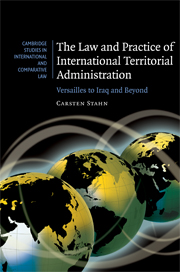Book contents
- Frontmatter
- Contents
- Foreword
- Preface
- Selected table of cases
- List of abbreviations
- Table of engagements
- Introduction
- Part I The historical and social context of international territorial administration
- Part II The practice of international territorial administration: a retrospective
- Part III The foundations of international territorial administration
- Part IV A typology of legal problems arising within the context of international territorial administration
- Part V International territorial administration at the verge of the twenty-first century: achievements, challenges and lessons learned
- Introduction
- 17 Strong on concept, imperfect in practice: international territorial administration as a policy device
- 18 International territorial administration and normative change in the international legal order
- Bibliography
- Index
- CAMBRIDGE STUDIES IN INTERNATIONAL AND COMPARATIVE LAW
Introduction
Published online by Cambridge University Press: 19 January 2010
- Frontmatter
- Contents
- Foreword
- Preface
- Selected table of cases
- List of abbreviations
- Table of engagements
- Introduction
- Part I The historical and social context of international territorial administration
- Part II The practice of international territorial administration: a retrospective
- Part III The foundations of international territorial administration
- Part IV A typology of legal problems arising within the context of international territorial administration
- Part V International territorial administration at the verge of the twenty-first century: achievements, challenges and lessons learned
- Introduction
- 17 Strong on concept, imperfect in practice: international territorial administration as a policy device
- 18 International territorial administration and normative change in the international legal order
- Bibliography
- Index
- CAMBRIDGE STUDIES IN INTERNATIONAL AND COMPARATIVE LAW
Summary
International territorial administration has seen an unprecedented revival over the last decade. It is rightly praised as a tool of dispute settlement and conflict resolution. Initiatives such as the concept of responsibility to protect suggest that international administration will remain one of the instruments of foreign policy in the twenty-first century. At the same time, some of the very notions underlying this project have become open to challenge. Arguments like elevation to civilisation and trusteeship, which have been recurring features of the practice of administration under the Mandate and Trusteeship Systems, are subject to review. Some of the techniques used in this context (e.g. the imposition of normative standards, the lack of accountability of international administrators) are increasingly questioned in the light of a people-centred vision of governance and a growing recognition of domestic ownership. Moreover, there is still a lack of institutional culture. The planning and operation of international administrations has remained dictated by improvisation and case-by-case approaches. Projects of administration were carried out under many different headings, namely under the auspices of three different UN organs (the Trusteeship Council, the General Assembly and the Security Council), the authority of the EU (Mostar) or the leadership of coalitions of states acting with Security Council endorsement (Bosnia and Herzegovina, Iraq). In many cases, little time was spent considering the appropriateness of the governance model or the techniques required to ensure long-term stability. A process of review of the policies of international territorial administration has only started recently.
- Type
- Chapter
- Information
- The Law and Practice of International Territorial AdministrationVersailles to Iraq and Beyond, pp. 731 - 732Publisher: Cambridge University PressPrint publication year: 2008

